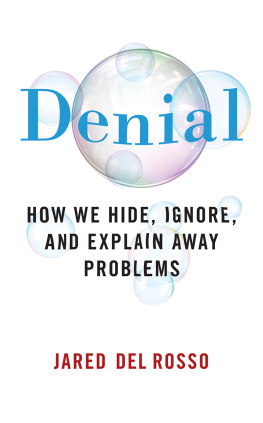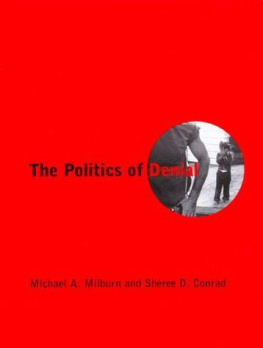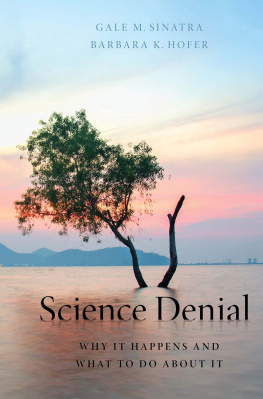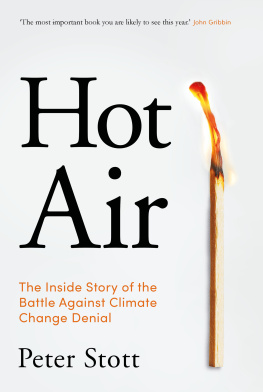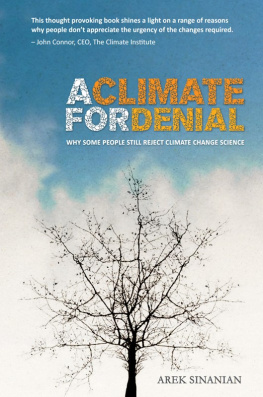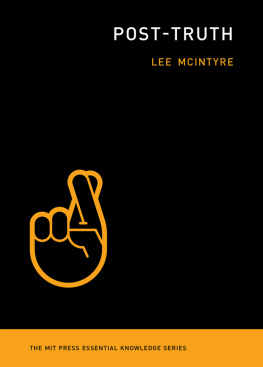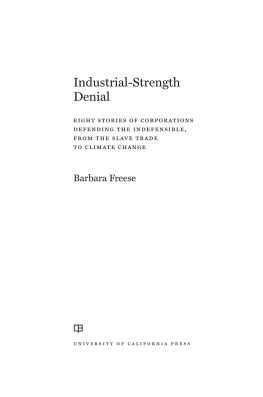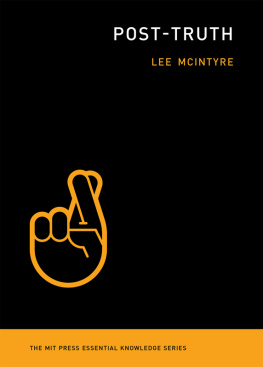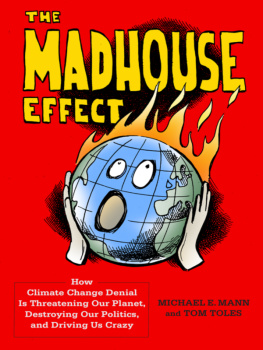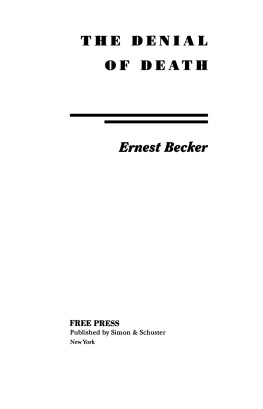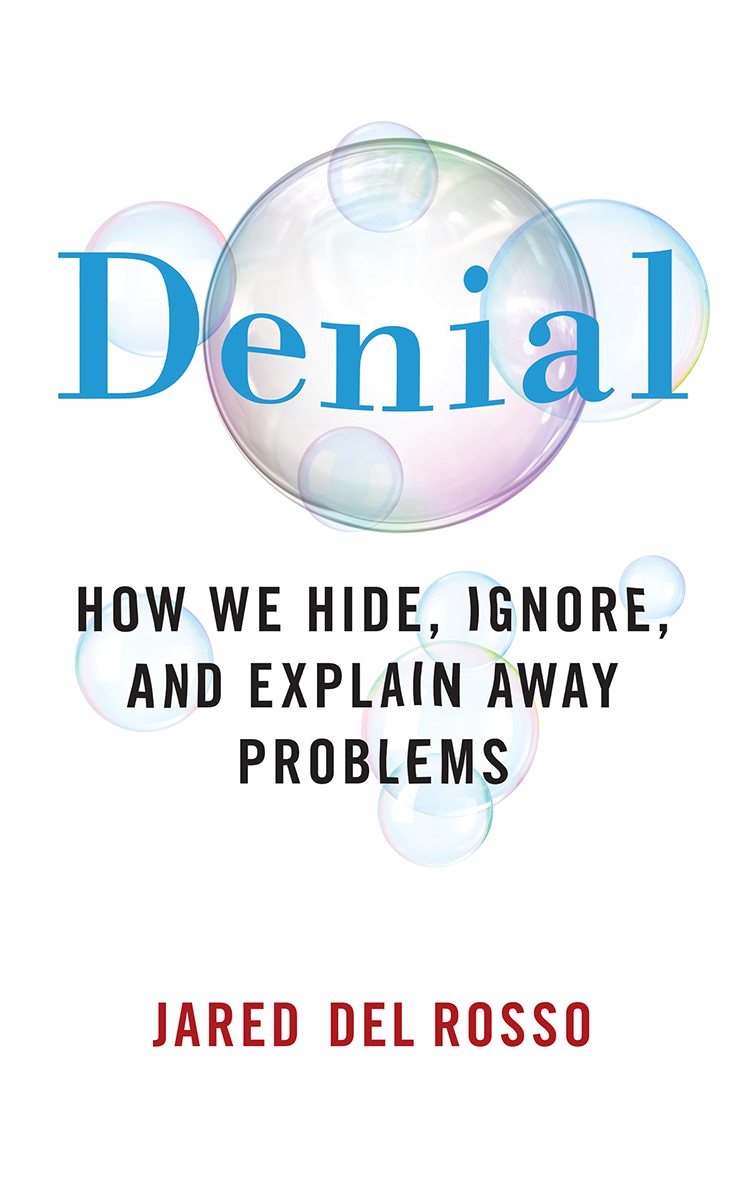
Denial
Denial
How We Hide, Ignore, and Explain Away Problems
Jared Del Rosso

NEW YORK UNIVERSITY PRESS
New York
NEW YORK UNIVERSITY PRESS
New York
www.nyupress.org
2022 by New York University
All rights reserved
References to Internet websites (URLs) were accurate at the time of writing. Neither the author nor New York University Press is responsible for URLs that may have expired or changed since the manuscript was prepared.
Library of Congress Cataloging-in-Publication Data
Names: Del Rosso, Jared, author.
Title: Denial : how we hide, ignore, and explain away problems / Jared Del Rosso.
Description: New York : New York University Press, [2022] | Includes bibliographical references and index.
Identifiers: LCCN 2021044588 | ISBN 9781479828968 (hardback ; alk. paper) | ISBN 9781479815944 (ebook) | ISBN 9781479814565 (ebook other)
Subjects: LCSH: Denial (Psychology)Social aspects. | Self-deception. | Problem solving.
Classification: LCC BF175.5.D44 D45 2022 | DDC 155.2dc23
LC record available at https://lccn.loc.gov/2021044588
New York University Press books are printed on acid-free paper, and their binding materials are chosen for strength and durability. We strive to use environmentally responsible suppliers and materials to the greatest extent possible in publishing our books.
Manufactured in the United States of America
10 9 8 7 6 5 4 3 2 1
Also available as an ebook
To Greg MacAvoy, Gila Hayim, and Stephen Pfohl,
my teachers,
who left me better than they found me.
And to my students,
who so often do the same.
Contents
I T wasnt much, just an offhand remark amid the most forgettable of things, a weather report on Colorados public radio station. Highs in the seventies in the Denver metro region, I remember the host announcing. Sun. A beautiful fall day, even if its a bit hazy in some places. Crisp.
That late September 2020 morning, I spotted ash drifting over my yard. This was the haze to which the weather report referred. The ash remained stubborn evidence of the states wildfires. Those fires themselves referred to the enduring droughtcaused by both a natural dry cycle and climate changeand extreme heat in the southwest. True, the ash was light that morning. Not nearly as much fell as had a few weeks prior. Not nearly as much fell here, over my home, as blanketed the northwest of the United States that year. But, somewhere, Colorado burned. We could still smell it, the pungent smoke that tested our lungs. The state issued another air-quality advisory, as it had for much of the summer and as it would for much of the autumn. This was our new normal, what passed for a beautiful fall day in Colorado. All it took was a bit of disbelief, a sense that we could talk about the weather without mentioning the ash we saw, the smoke we breathed, and the irritation in our throats.
The night before, in the first debate of the 2020 election, President Donald J. Trump had refused to condemn white supremacists. (How honest and tragic his noncommittal proved.)
Two days after his debate with Biden, the day after that beautiful fall day in Colorado, President Trump tested positive for COVID-19. For six months, he had minimized the virus, even as it had killed more than two hundred thousand people in the United States by mid-September 2020. In fact, months earlier, Trump had boasted that, like a miracle, the virus would disappear.
Ash in the sky, virus in the air, demagogues in our politics. A beautiful fall day, secured by that strongest of adhesives, denial.
For nearly a decade and a half, I have been researching and teaching on denial, the social strategies people use to hide, ignore, and explain away problems. As a sociologist, I met these processes through my studies of the politics of US torture.
But denial is not only for these most global of problems and leaders. Even as I studied the denials of national politicians whose lives and problems were nothing like mine, I was continually returned, by national news, to Pine Bush, the small upstate New York town where I spent most of the first half of my life. In 2012, the public school district that had educated my friends, my siblings, and me was exposed for what it had long kept hidden: deep and enduring anti-Semitism. A suit, by several Jewish families in the school district, alleged that the district had consistently overlooked anti-Semitic graffiti, verbal harassment, and physical assaults. The New York Times opened an article on the lawsuit with these descriptions of the allegations.
The swastikas, the students recalled, seemed to be everywhere: on walls, desks, lockers, textbooks, computer screens, a playground slideeven on a students face. For some Jewish students in the Pine Bush Central School District in New York State, attending public school has been nothing short of a nightmare.... They have reported being pelted with coins, told to retrieve money thrown into garbage receptacles, shoved and even beaten. They say that on school buses in this rural part of the state, located about 90 minutes north of New York City and once home to a local Ku Klux Klan chapter president, students have chanted white power and made Nazi salutes with their arms.
Three years later, Foreign Language Week at the high school was canceled after public outrage regarding the Language Clubs reading of the Pledge of Allegiance in Arabic. The local paper and the Washington Post both printed a photograph of a car in the high schools parking lot with a xenophobic message on its rear window: WE LIVE IN AMERICA SPEAK ENGLISH .
Then, in 2019, the New York Times reported that the school districts own surveys, which a court filing made public, offered evidence that anti-Semitism remains a stubborn problem at Pine Bush. One-third of middle school and high school students said they had seen or heard incidents of anti-Semitism in school the previous year.
I realize now that none of this was particularly surprising. As a child, I had thought swastikas to be the normal graffiti of the older kids, as they were commonly carved into bus seats and classroom desks. As far north as New York is, Confederate paraphernalia adorned trucks and cars in town. A long-standing (and unfounded) rumor, revealing of the sympathies of some town residents, still circulated: people in Pine Bush had a conspiratorial connection to John Wilkes Booth and had known about the assassination of Lincoln even before it was reported in the regions newspapers. Looking back, the legacies of racism and anti-Semitism in Pine Bush and, especially, its schools are obvious. But none of this was discussed openly by the adults in my life; they and I were protected from these horrors by our whiteness and our Christian upbringing.
Despite evidence that white supremacy, anti-Semitism, and Islamophobia festered in Pine Bush, some residents of the town came together to protect its innocence. Following reports on the Jewish students lawsuit, residents rallied in November 2013. Rather than denounce anti-Semitism and express their support for the students who had sued the school, the towns rally had a defensive tone, as residents spoke against the unfairness of reporting on the allegations.
Swastikas on the school walls, Nazi salutes in the buses. A loving, caring community, secured by that most stubborn of adhesives, denial.
Interpersonal, collective, and social problems threaten our sense of how things are and should be. Denial of these threats offers us a way out. Using denial, we can maintain a sense of normalcy, even when we encounter information to the contrary. Despite drifts of ash and smoke, a fall day can seem beautiful for its sunny sky and seventy degrees. In writing this book, I have tried to identify, categorize, and describe the strategies of denial that people use to maintain the sense that everything is fine, even when it seems obvious that everything isnt.
Next page
